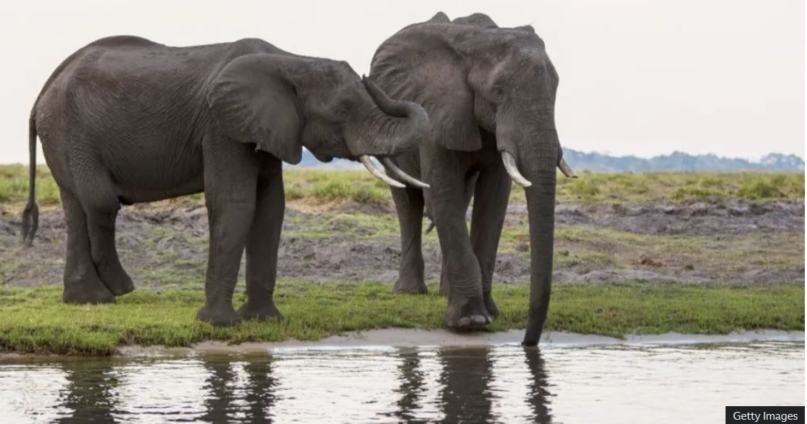African elephants call each other and respond to individual names — something that few wild animals do, according to new research published Monday.
The names are one part of elephants’ low rumbles that they can hear over long distances across the savanna. Scientists believe that animals with complex social structures and family groups that separate and then reunite often may be more likely to use individual names.
“If you’re looking after a large family, you’ve got to be able to say, ‘Hey, Virginia, get over here!’” said Duke University ecologist Stuart Pimm, who was not involved in the study.
It’s extremely rare for wild animals to call each other by unique names. Humans have names, of course, and our dogs come when their names are called. Baby dolphins invent their own names, called signature whistles, and parrots may also use names.
Each of these naming species also possesses the ability to learn to pronounce unique new sounds throughout their lives — a rare talent that elephants also possess.
For the study in Nature Ecology & Evolution, biologists used machine learning to detect the use of names in a sound library of savanna elephant vocalizations recorded at Kenya’s Samburu National Reserve and Amboseli National Park.
The researchers followed the elephants in jeeps to observe who called out and who appeared to respond — for example, if a mother called to a calf or a matriarch called to a straggler who later rejoined the family group.
Analyzing only the audio data, the computer model predicted which elephant was being addressed 28% of the time, likely due to the inclusion of its name. When fed meaningless data, the model only accurately labelled 8% of calls.
“Just like humans, elephants use names but probably don’t use names in the majority of utterances, so we wouldn’t expect 100%,” said study author and Cornell University biologist Mickey Pardo.
Elephant rumbles include sounds that are below the range of human hearing. The scientists still don’t know which part of the vocalization is the name.
Researchers tested their results by playing recordings to individual elephants, who responded more energetically, ears flapping and trunk lifted, to recordings that contained their names. Sometimes elephants entirely ignored vocalizations addressed to others.
“Elephants are incredibly social, always talking and touching each other — this naming is probably one of the things that underpins their ability to communicate to individuals,” said co-author and Colorado State University ecologist George Wittemyer, who is also a scientific adviser for the nonprofit Save the Elephants.
“We just cracked open the door a bit to the elephant mind.”
Latest Stories
-
Fire guts Kwadaso Wood market in Kumasi
2 hours -
GPL 2024/25: Gold Stars revive title hopes with win over Berekum Chelsea
2 hours -
We won’t entertain arrogant appointees – Deputy NDC Youth organizer warns
4 hours -
Akufo-Addo’s Aide-De-Camp in good shape after collapsing in Parliament
4 hours -
NPP notifies Parliament of its selected leaders for the 9th parliament
4 hours -
Dumelo loses father days before his swearing in as MP
5 hours -
NPP’s Mandamus Application: This is how the High Court ruled on 4 disputed constituencies
6 hours -
‘Forty Weeks and More’ premieres Jan. 18 on Joy Prime
6 hours -
GHANET urges caution against HIV during the new year festivities
6 hours -
High Court in Accra orders EC to re-collate results for Techiman South
7 hours -
NDC files notice of appeal after High Court ordered completion of results collation in 4 constituencies
7 hours -
2024 Election: South Tongu MP-elect gave Mahama the highest percentage of votes
8 hours -
Daily Insights for CEOs: Mastering time management as a CEO
8 hours -
Kantamanto Market fire: Strengthen investigations or expect more fire – Dwamena-Aboagye
8 hours -
Belgian Foreign Minister to lead EU delegation to John Mahama’s inauguration
8 hours

